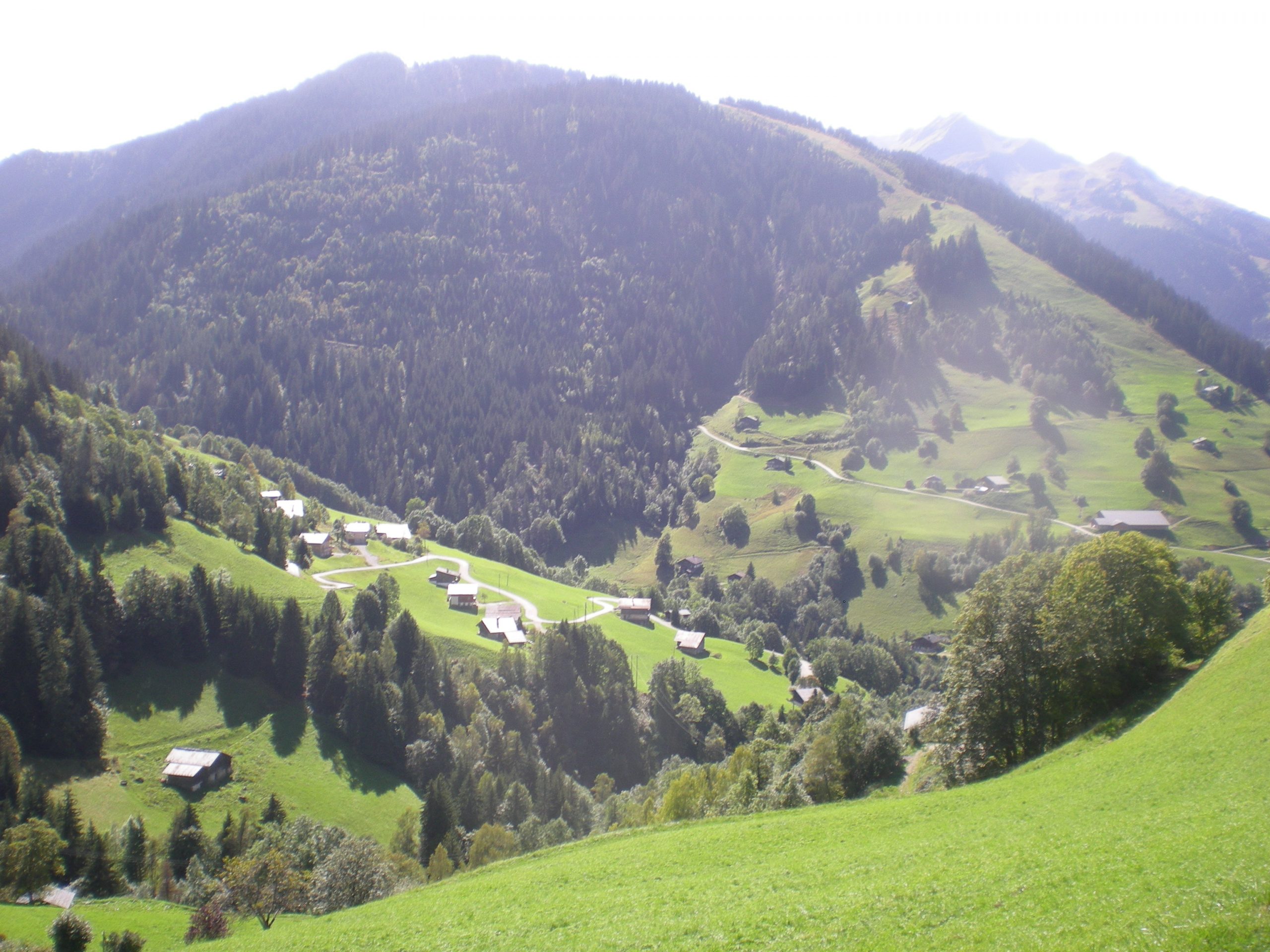
By Philippe Barret
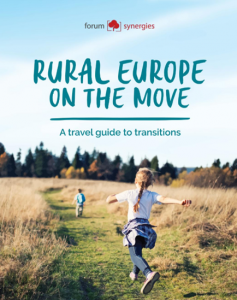
The plights of rural Europe are by now well-documented – depopulation, political invisibility, in some instances the rise of populism and a barrage of negative stereotypes as backward, culture-less and lethargic places. Raised far less frequently are the unique contributions these areas offer the European community and the dynamic and innovative ways some areas are responding to the greatest challenges facing this continent.
Forum Synergies is an organisation which since its inception 25 years ago has identified and highlighted the potential of rural Europe. Gathering local communities, farmers, foresters, environmentalists, and political decision-makers from across the continent, the organisation has demonstrated and bolstered grassroots rural sustainability, arguing that separate from EU policy-making, individuals and groups across the continent are building sustainable, resilient rural futures of their own accord.
Rural Europe on the Move: A travel guide to transitions collects some of these tales. Written by 12 authors and edited by ARC2020’s Hannes Lorenzen and Helene Schulze, the book travels from the Isle of Eigg in Scotland to Transylvania, from Latvia down to Portugal to explore how rural communities have responded to climate breakdown, the refugee crisis, the mafia and the concentration of land ownership. It reveals the importance and value of intergenerational collaboration, traditional knowledge, constructive communication and cross-continental exchange in creating resilient rural areas. Crucially it is an invitation to young people across the continent to get stuck in.
In this excerpt from the book, Philippe Barret tells the story of Beaufortain, a community in the French Alps that has been coming together to practice rural sustainability since the 17th century. Beaufortain also happens to be the home of ARC2020’s project to build rural resilience in France – “Nos campagnes en résilience”. In this chapter you’ll meet some of the key people involved in this latest venture: coordinator Valérie Geslin, volunteer Jeanine Sochas, and farmer Pierre Gachet.
With my European friends I stand in the ripening room of the Beaufort cheese cooperative in the village of Beaufort, in the Savoie region of southern France, surrounded by impressive whole cheese wheels. We are a colourful group of Europeans participating in a field trip on one of Forum Synergies’ European Rural Sustainability Gatherings. We want to learn about local innovations based on sustainable practices.
Jocelyne Viard-Crétat, the salesperson of the local dairy cooperative invites us to meet the seasons of Beaufort cheese: “There are three kinds of Beaufort: Winter, Summer and high mountain cheese. Winter Beaufort is produced when cows eat hay, and Summer Beaufort when they eat grass. There is also a third season of Beaufort that we do not sell in cooperatives, which is produced exclusively in the higher pastures, with milk from just a single herd. Farmers are the only ones who have the right to call their cheese ‘Alpage’, which comes from their Alpine pastures,” she explains. We are invited to dive into Beaufortain mountain pastures with summer grass and winter hay, thin slices of Beaufort on our tongues.
My connection to the Beaufortain area had been lost somewhere in the mists of time. No matter how much I searched in my memory, I cannot find the triggering moment. I end believing that this connection is due to the wonderful taste and fragrance of Beaufort, ‘the king of Gruyères’, whose flavour and texture have always delighted me. Beaufort carries a protected geographical label of origin (PDO) and therefore no other cheese can be produced and marketed under this name.
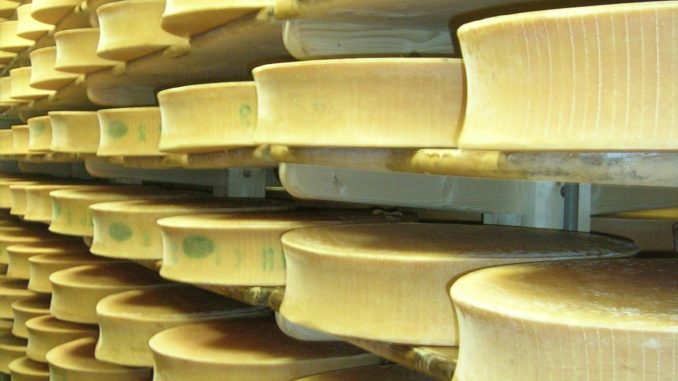
Prosperity through migration
Many years ago, when I had proposed a visit to the Beaufortain region to my Forum Synergies friends, I had just discovered the convincing history of sustainable development behind this cheese, which is also a European history dating back to the 17th century. Beaufort cheese was born from an exchange between the farmers of this small Alpine massif and Swiss cheese-makers. According to historians, the cradle of these great cheeses is a mountainous region of central Switzerland, at the gateway to the Alpine passes opening to Italy. From this region, the technique of making this ‘long-life cheese’ has spread to the current region of Fribourg and the municipality of Gruyères.
Faced with the economic difficulties of the Fribourg region of that time, cheese-makers emigrated to neighbouring Franche-Comté and Savoie where rich landowners hired them to develop their mountains. This development of a new type of cheese in Beaufortain became a source of sustainable prosperity and autonomy for the remote region for nearly four centuries now.
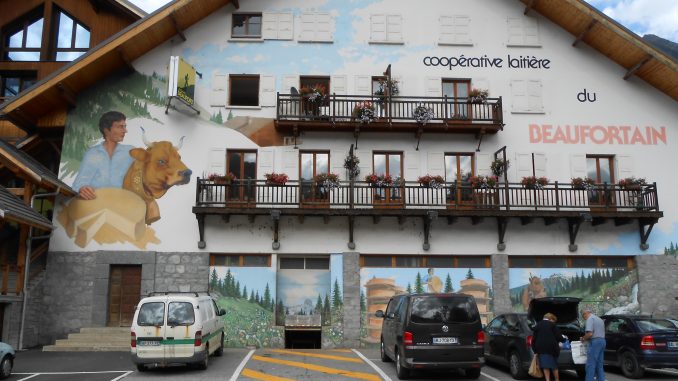
Sustainable development is not a quiet river
It took a lot of personal struggle, creativity, dialogue and tenacity for the people of Beaufortain to meet the challenges that have marked these four centuries. The most recent, the modernisation and restructuring of agriculture from the 1970s onwards, is not the least. “How can we react to the widespread concentration and intensification of agriculture that threatens to confine this mountain area to exclusively tourism and energy functions? What if it accelerates the rural exodus and destroys beautiful agricultural landscapes?” These were the questions raised that led the residents of the Beaufortain region to think and act collectively forty years ago, when they launched the Beaufort cheese cooperative.
First were some visionary farmers who believed that it was possible to maintain a small family farm under two conditions: increasing the added value of their cow’s milk by favouring quality cheeses; and ‘sticking together’ by processing and marketing the cheese through their cooperative.
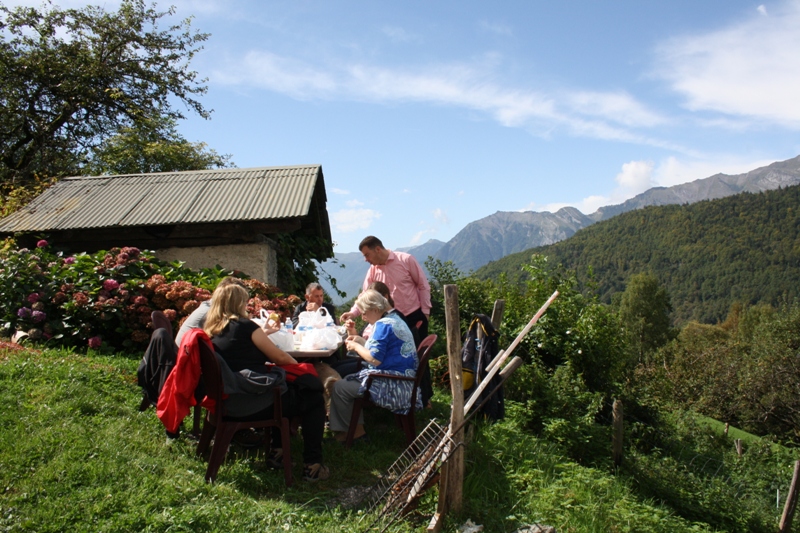
Be as independent as possible
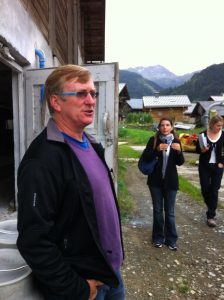
At the Forum Synergies’ European gathering of 2014, we visited Pierre Gachet’s farm. He is a small milk farmer and member of the Beaufort de Praz farmers’ cooperative. He shared with us his recipe for survival in the high mountains: “We are several owners. The cooperative has allowed us to move in the right direction as peasant farmers. We must be as independent as possible, use as few external inputs as possible and be able to develop renewable energies from local resources. The Swiss taught us how to make Beaufort. This has allowed us to be more autonomous in terms of making food from grass, in the form of milk and cheese. We preserve the cheese only with salt. We are five workers here. I consider my employees as partners. Their salary is the same as ours. So my example as peasant farmer is simple: Let’s say I invest a fixed amount of our money in the morning, and there’s nothing left of it in the evening. In fact it is not a sum of money that I have on the table. It is a sum of grass or hay of which the cows make milk. I then have to transform that milk into Beaufort cheese. At the end of the day I see what I have got. The more I have left for those who work on the farm, the better for me. Then I am less dependent on banks, shareholders or merchants. For the last three years, we do not borrow anything from banks, only from individuals. And if I know someone has spare money, instead of borrowing from banks, we ask them to lend us the money we need.”
The success of the cooperative is undeniable. Because, even if land concentration and the decline in the number of farms continues, the process here is slower than elsewhere. All visitors, whether from Forum Synergies or somewhere else, can still enjoy a lively and diversified mountain landscape.
“It is not a sum of money that I have on the table. It is a sum of grass or hay of which the cows make milk.” – Pierre Gachet
An engaged retirement – intergenerational energy
Among the pioneers of the Beaufortain movement, I had the opportunity to meet Hubert Favre, a friendly retiree, always inclined to praise the merits of his area. At the end of the 1950s, Hubert was a teacher in Arêches, one of the four municipalities of Beaufortain. In 1962, he created a newsletter ‘Ensemble dans le Beaufortain’. Today it is a quarterly newspaper. He also founded the Beaufortain Animation Association in 1973 of which Jeanine Sochas, who is a member of Forum Synergies, was director for 15 years. For more than 40 years, this association has played an essential role in the sustainable development of Beaufortain by promoting citizens’ participation in local life, by organising activities for young people, families and the elderly, while promoting cultural openness.
Valérie Geslin, then director of Beaufortain Animation Association, explains the principles of these activities: “Our association is based on four pillars: solidarity, human dignity, democracy and sustainable development. This means villagers make choices at each stage of the decision-making process: they have four different missions – one on human resources, another on projects, one on the project economy and one on partnership. Our association is interested in the needs of the local population so that they can stay here on the territory,” Valérie Geslin continued.

“Our association is interested in the needs of the local population so that they can stay here on the territory” – Valérie Geslin
Territorial dialogue transforms isolated thinking
For me, dialogue is a major asset for sustainable development, and it is also essential in Beaufortain. The training in territorial dialogue, organised by Savoie Vivante, which I have chaired for more than ten years, has seen an impressive number of Beaufortain stakeholders, elected officials, civil servants from the municipalities, mayors and farmers, participating. I helped the municipality to resolve a conflict that arose around a biotope preservation project in an Alpine pasture area near a hydroelectric dam. Farmers were not ready to accept new environmental constraints. Mediation took place between environmentalists, high mountain farmers, the hydroelectric dam manager and the municipality and made it possible to transform the conflict into a sustainable development project where farmers do no longer perceive the environmental dimension in isolation from their economic situation.
“For me, dialogue is a major asset for sustainable development”
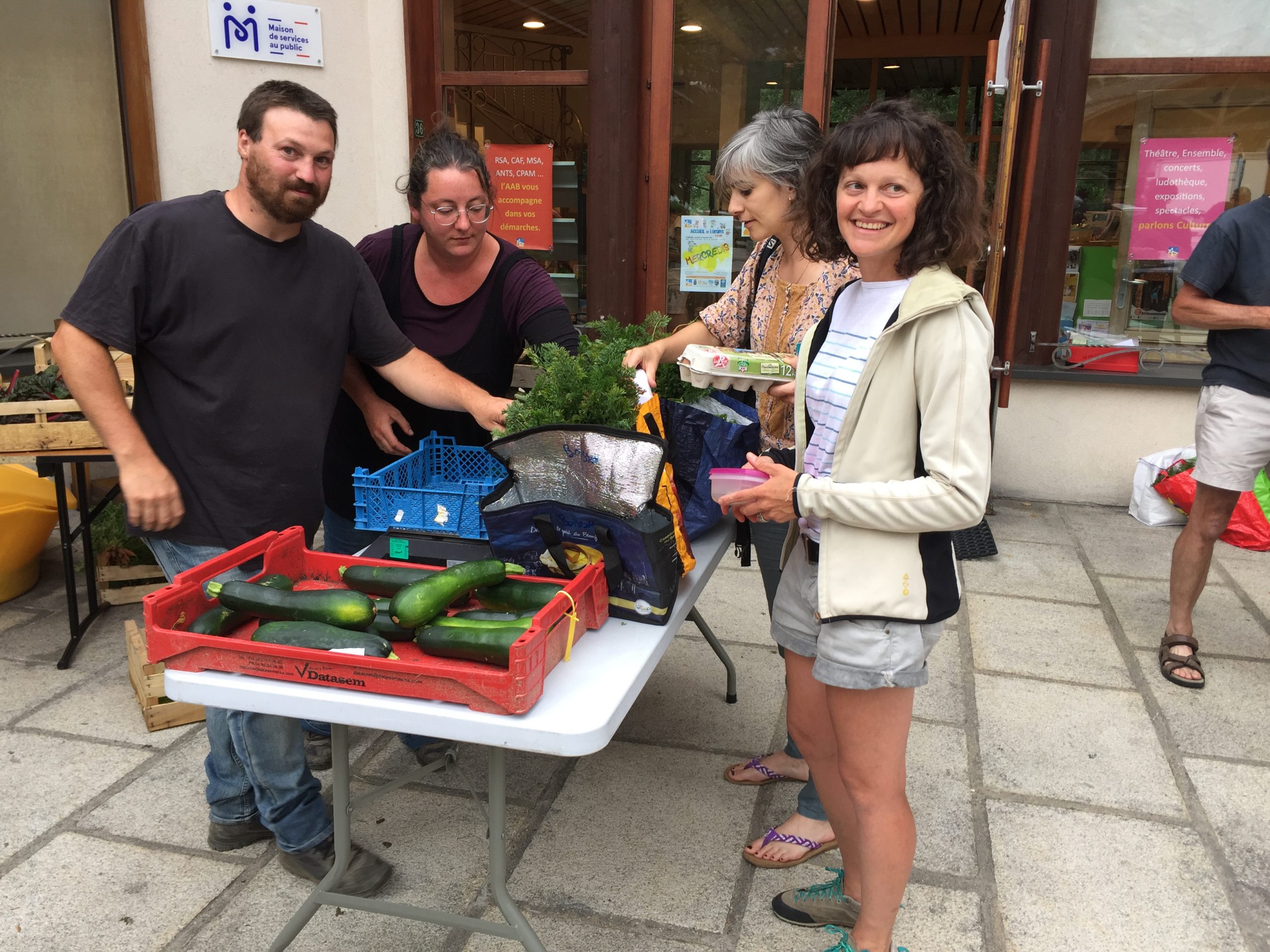
Top-down administrative restructuring
Since Forum Synergies gathered in Beaufortain in 2014, important administrative restructuring of communities and regions has occurred with the application of the so-called ‘NOTRE Act’ of 2015. Larger administrative units were established in all regions of France. The ‘Communauté de communes du Beaufortain’ was attached to the Communauté d’agglomération Arlysère [www.arlysere.fr]. Beaufortain was absorbed from an intercommunity organisation of 4 communes and 4500 inhabitants into an administrative unit of 40 communes with 60000 inhabitants.
In Savoie this has led to broad dissolving of organisations like Savoie Vivante which have also been absorbed into new bigger territorial service centres like AGATE (Agence Alpine de Territoire) which receive funding from the ‘département’. Former director of Savoie Vivante Aurélie Le Meur is now offering services of territorial dialogue to the local authorities, regional administration and elected councils, but believes that a new bottom-up movement is necessary to revitalise the community spirit in Savoie.
“We couldn’t escape these dramatic changes,” says Jeanine Sochas. “We just had to make the most of them. Our civic associations have lost very much of their harmony and integrative energy since we had to follow new administrative structures. But I am also glad that new and encouraging initiatives are emerging.”
She has launched an ‘AMAP’ (Association pour le Maintien d’une Agriculture Paysanne) together with farmers and consumers of her village in order to obtain fair prices for both and to encourage shared responsibility to preserve Beaufortain’s living rural landscape. About 45 families are members of this AMAP. Throughout the year, they are supplied with local and fresh products every two weeks, including fruit and vegetables, cheese and local cereals.
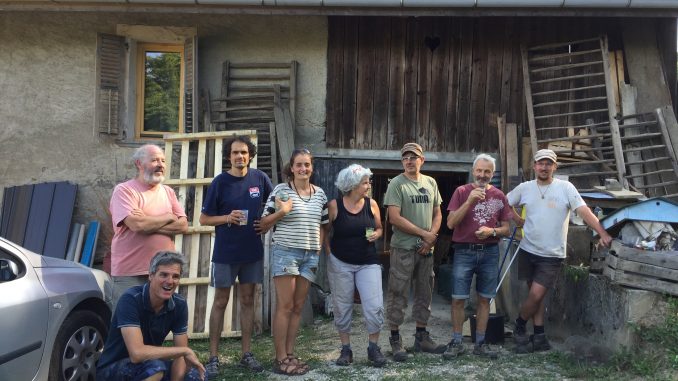
Travelling farmers – a new generation
Jeanine is also proud to see young families settling in the neighbourhood. Céline Fournier and Maxime Leportier are an example. They are part of an initiative called ‘paysans voyageurs’ – travelling farmers. After travelling through Latin America, visiting and working on farms and local initiatives, they decided to settle in Thénésol near Alberville. Usually it is almost impossible to start farming without family heritage. But as they had worked as volunteers at Terre de Liens (Access to land network) in Savoie, they knew about the various initiatives and legal possibilities to gain access to land and a farm, with support from civil society initiatives. Their new settlement was possible through a type of community sustained farming. To help them settle down as farmers, they called upon a solidarity savings system called ‘GFA’ (Groupement Foncier Agricole) to access a three-hectare farm. Contributions to the cost of the farm came from their families and friends but also from an event called ‘Le grand bivouac’ , a festival where young people share their experience of travelling the world and working with peasant farmers.
“Access to land for newcomers and new farmers is a major problem for young people who have not inherited a farm from their parents. It remains a crucial point throughout Europe,” says Céline. “We have been able to settle here with the help of many people who support newcomers in farming. We may at some point wish to move somewhere and it’s perfectly possible that other young people can take our farm over. This could be a new form of making farming more attractive for young people and to revitalise rural areas.”
“Access to land for newcomers and new farmers is a major problem for young people who have not inherited a farm from their parents.” – Céline Fournier
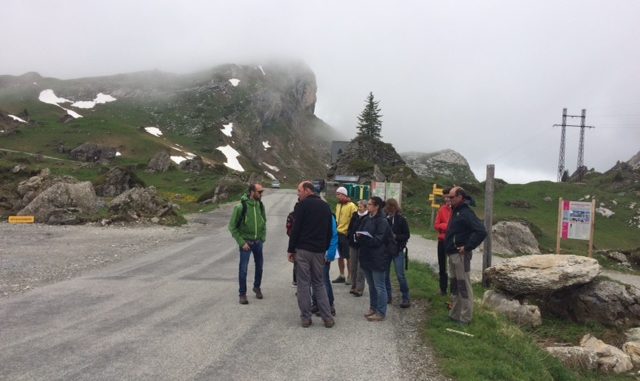
The Beaufortain Experience – In a nutshell
The example of the Beaufortain community has shown us that close cooperation for a specific quality product like Beaufort cheese is essential for the survival of peasant farming. Mutual support and expertise in milk and cheese production offer the necessary independence from external financial support and have preserved an attractive landscape and services for rural tourism. With its European Rural Sustainability Gathering, Forum Synergies has highlighted the strong principles which associations in Beaufortain represent: human relations, projects, the economy and partnership based on the needs of the local population so that they can stay in the territory.
However, Beaufortain is also an example for how major, top-down, structural administrative changes can seriously destabilise grassroots movements. This is a serious threat for rural development organisations across the continent. In such cases, local initiatives are forced to be flexible and stay motivated so that new local initiatives and cooperatives can sprout up again.
What’s exciting for Beaufortain at the moment is that young families are moving into the area. They are needed to keep the area dynamic and lively but young farmers and especially new entrants into farming face some serious challenges. Among the trickiest is access to land. The French support structure Terre de liens and its European Access to land network, as well as many other solidarity savings and investment systems, now play an important role to help these people get access to land. Such initiatives are vital to combat rural depopulation, an aging population in the farming sector and to bolster a transition toward new, sustainable peasant farming systems.
Download the full book Rural Europe on the Move: A travel guide to transitions
The book can also be ordered as a hard copy
Learn more about ARC2020’s project to build rural resilience in France – based in Beaufortain!
More from “Rural Europe on the Move”
More on France
Rural Dialogues | Intergenerational Collaboration in the Vineyards of Southern France
AgTechTakeback | L’Atelier Paysan on Self-Build Communities in Farming


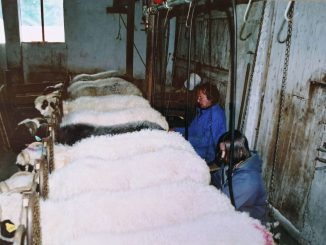
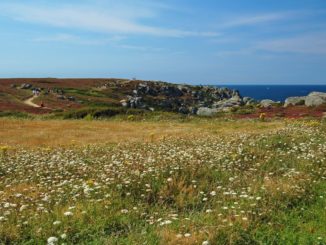
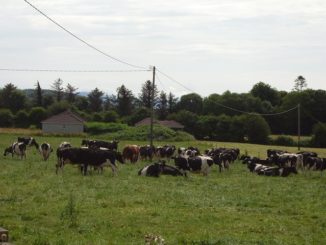
1 Trackback / Pingback
Comments are closed.